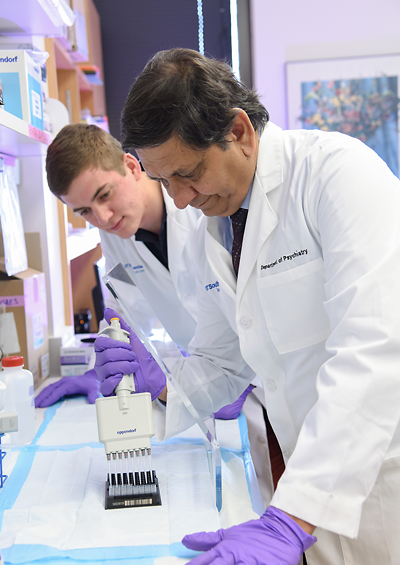Sertraline Fails to Reduce Depression in Patients With Chronic Kidney Disease
Abstract
Patients who received a standard dose of sertraline for 12 weeks reported similar depressive symptoms as those who received placebo and no improved quality of life other than sleep.
An estimated 15 percent of people in the United States have chronic kidney disease (CKD)—25 percent of whom are estimated to have comorbid depression. Despite this high prevalence of CKD-associated depression, few studies have examined how these patients respond to standard antidepressants. The research that does exist has primarily been limited to CKD patients on dialysis and has produced inconclusive data on the efficacy of antidepressants.

Madhukar Trivedi, M.D., (front) has conducted numerous studies that suggest depression comorbid with another chronic illness may be a distinct subtype of depressive disorder.
A study published late last year in JAMA suggests the selective serotonin reuptake inhibitor (SSRI) sertraline is no more effective than placebo at reducing depressive symptoms in adults with non-dialysis-dependent CKD. Sertraline use also resulted in more adverse side effects (including nausea and vomiting) than placebo. As a result, the study authors recommended against the use of the medication when treating people with CKD and depression.
“While the strictest read [of the data] only points to sertraline as ineffective, my feeling is that these results will hold true for other antidepressants, at least all SSRIs,” said senior study author Madhukar Trivedi, M.D., the Julie K. Hersh Chair for Depression Research and Clinical Care at the University of Texas Southwestern Medical Center in Dallas.
Based on his own clinical and research experiences, Trivedi believes that non-serotonin-based medications such as bupropion would be better options, along with behavioral therapies, exercise therapy, and other non-pharmacological treatments. But, further research is needed to identify optimal strategies, he told Psychiatric News.
For this study, Trivedi and colleagues enrolled 201 adults with moderate or severe depression (defined as a score of 11 or higher on the Quick Inventory of Depressive Symptomology [QIDS] self-report scale) and stage 3, 4, or 5 CKD that did not require dialysis.
The participants received either daily placebo or sertraline for 12 weeks; the sertraline was started at 50 mg/day and scaled up to 200 mg/day depending on tolerance and response.
At the end of 12 weeks, depressive symptoms were similar between the two study groups. Clinician-rated QIDS scores improved by about 4 points in both groups, while about 15 percent of patients in each group achieved remission of their depression (clinician-rated QIDS score of 5 or less). The only difference between the two groups in quality-of-life measures was seen in sleep improvements in the group receiving sertraline.
The average final dose in the sertraline group was about 150 mg/day, which the authors noted is well within the recommended therapeutic range. This suggests that inadequate dosing was not the reason the sertraline patients did not improve, the authors said. Likewise, an excess “placebo effect” was not responsible for masking the effect of sertraline, as the improvements among study participants receiving placebo were lower than those typically reported in antidepressant studies.
“We are beginning to wrestle with the reality that these psychiatric disorders have many subtypes,” said Trivedi. “Depression that arises as part of another medical disorder may be a distinct type of illness that will require novel interventions.”
Trivedi has conducted other studies that support the theory that there are multiple depression subtypes. He has found that depressed patients who have elevated levels of certain inflammatory biomarkers respond differently to medications. His lab has identified three such markers so far: C-reactive protein, interleukin-17, and platelet-derived growth factor. Patients with higher levels of any of these three biomarkers do not respond well to SSRI monotherapy, but do respond better to an SSRI plus adjunctive bupropion.
Many patients with CKD have chronic inflammation, which may lead to the SSRI resistance, Trivedi said. He cautioned, however, that many of the participants in this study had other medical problems, including diabetes and heart failure, and complications from these chronic diseases may contribute to SSRI resistance as well.
This study was funded by grants from the National Institute of Diabetes and Digestive and Kidney Diseases and Department of Veterans Affairs. ■



